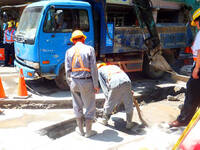《TAIPEI TIMES》 Autumn-winter measures issued
REMAINING VIGILANT: Minister of Health and Welfare Chen Shih-chung said that more testing is better than a healthcare system that is overrun
By Lee I-chia / Staff reporter
The Central Epidemic Command Center (CECC) yesterday announced a program of disease prevention measures for the autumn and winter.
Starting on Dec. 1, the program would tighten measures regarding border controls and local communities, while increasing testing, said Minister of Health and Welfare Chen Shih-chung (陳時中), who heads the center.
The program is expected to run until Feb. 28, but the length could be altered, he added.
“To enter Taiwan, all travelers will need to provide a negative result from a polymerase chain reaction (PCR) test taken within three days of boarding their flight,” Chen said, adding that the rule applies to foreign nationals and Taiwanese.
Those with emergency situations could apply for special entry, he said.
If people come from areas where a PCR test or a result certificate cannot be obtained, they could get Ministry of Foreign Affairs approval to enter Taiwan, but they must pay for a PCR test upon their arrival, he added.
The test result must be issued by a government-accredited hospital in their country of departure, with a report in Chinese or English.
The report must show the name on the passenger’s passport, their date of birth, the specimen collection date, result release date, name of the tested virus, testing method and result interpretation.
“Enhanced COVID-19 prevention at the local community level is mainly about wearing a mask,” Chen said.
People would be asked to wear a mask at eight types of public venue: healthcare and long-term care facilities, public transportation, markets, schools, sports and exhibition venues, places of worship, recreational venues, and government facilities and business venues, he said.
Those failing to wear a mask after being asked would face a fine of up to NT$15,000 due to a breach of the Communicable Disease Control Act (傳染病防治法), the center said.
People could still remove their mask when eating or drinking, or if social distancing is possible or boards separate the seating, he said, adding that people should wear a mask at crowded outdoor gatherings.
The CECC would encourage hospitals to report suspected cases of disease, and give them incentives to increase testing on patients, especially those with pneumonia, and to monitor the health of medical personnel, Chen said.
The center said that it would remind physicians to report suspected cases and refer them for testing at hospitals, and amend the procedures for reporting and testing symptoms of those under home quarantine.
Asked whether testing capacity would be enough to cope with a possible increase in confirmed cases, Chen said that many countries’ healthcare systems have been overwhelmed by a surge in cases, so the center prefers to test more and tighten control measures.
Other program details can be found on the Center for Disease Control’s Web site at www.cdc.gov.tw/En.
新聞來源:TAIPEI TIMES

















